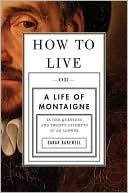More on this book
Community
Kindle Notes & Highlights
Read between
April 5 - April 7, 2025
This is not the same as the ethical question, “How should one live?” Moral dilemmas interested Montaigne, but he was less interested in what people ought to do than in what they actually did. He wanted to know how to live a good life—meaning a correct or honorable life, but also a fully human, satisfying, flourishing
Don’t read him as children do, for amusement, nor as the ambitious do, to be instructed. No, read him in order to live.
Death is only a few bad moments at the end of life, he wrote in one of his last added notes; it is not worth wasting any anxiety over.
Instead of turning a party into a death scene, as Montaigne had done in his youthful imagination, they turned their death scenes into parties.
If you don’t know how to die, don’t worry; Nature will tell you what to do on the spot, fully and adequately. She will do this job perfectly for you; don’t bother your head about it.
In the year of Christ 1571, at the age of thirty-eight, on the last day of February, anniversary of his birth, Michel de Montaigne, long weary of the servitude of the court and of public employments, while still entire, retired to the bosom of the learned Virgins [the Muses], where in calm and freedom from all cares he will spend what little remains of his life now more than half run out. If the fates permit, he will complete this abode, this sweet ancestral retreat; and he has consecrated it to his freedom, tranquillity, and leisure.
There is no more beautiful life than that of a carefree man; Lack of care is a truly painless evil. (Sophocles)
“How does one achieve peace of mind?” On the latter point, Plutarch’s advice was the same as Seneca’s: focus on what is present in front of you, and pay full attention to it.
Learning how to die was learning to let go; learning to live was learning to hang on.
The trick is to maintain a kind of naive amazement at each instant of experience—but, as Montaigne learned, one of the best techniques for doing this is to write about everything.
If others examined themselves attentively, as I do, they would find themselves, as I do, full of inanity and nonsense. Get rid of it I cannot without getting rid of myself. We are all steeped in it, one as much as another; but those who are aware of it are a little better off—though I don’t know.
“Forget much of what you learn” and “Be slow-witted” became two of Montaigne’s best answers to the question of how to live.
Un roi, une foi, une loi, went the saying: one king, one faith, one law. Hatred of anyone who ventured to suggest a middle ground was practically the only thing on which everyone else could agree.
It emphasizes inner freedom as a path to political resistance: a Montaignean position.
The Epicurean writer Lucretius suggested picturing yourself at the point of death, and considering two possibilities. Either you have lived well, in which case you can go your way satisfied, like a well-fed guest leaving a party. Or you have not, but then it makes no difference that you are losing your life, since you obviously did not know what to do with it anyway.
The key is to cultivate mindfulness: prosoche, another key Greek term. Mindful attention is the trick that underlies many of the other tricks. It is a call to attend to the inner world—and thus also to the outer world, for uncontrolled emotion blurs reality as tears blur a view. Anyone who clears their vision and lives in full awareness of the world as it is, Seneca says, can never be bored with life.
Friedrich Nietzsche would remark centuries later, most of the genuinely valuable observations about human behavior and psychology—and thus also about philosophy—“were first detected and stated in those social circles which would make every sort of sacrifice not for scientific knowledge, but for a witty coquetry.”
“Locked places invite the thief. The burglar passes by what is open.” Locks made a place look valuable, and there could be no sense of glory in robbing a household where one was welcomed by an elderly doorkeeper.
Contemporary demonologist Jean Bodin
politiques. The word itself was an accusation of godlessness.
They were no happier when Montaigne himself took over the diary-writing and told them that he had voided a stone “as big and long as a pine nut, but as thick as a bean at one end, and having, to tell the truth, exactly the shape of a prick.”
hellebore,
Marjorie Henry Ilsley ended her 1963 biography, A Daughter of the Renaissance,


